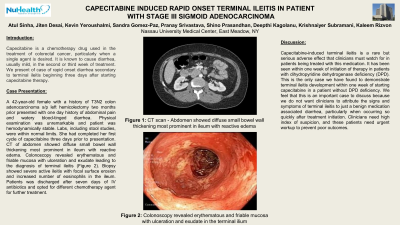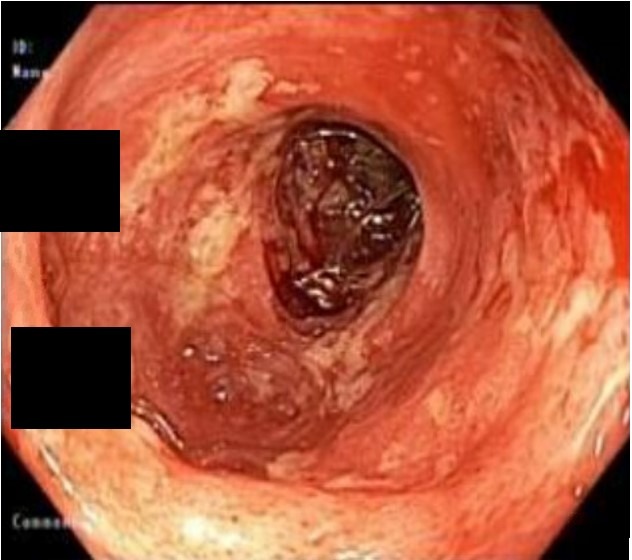Back

Poster Session C - Monday Afternoon
Category: Small Intestine
C0648 - Capecitabine-Induced Rapid Onset Terminal Ileitis in Patient With Stage III Sigmoid Adenocarcinoma
Monday, October 24, 2022
3:00 PM – 5:00 PM ET
Location: Crown Ballroom

- JD
Jiten Desai, MD
Nassau University Medical Center
East Meadow, NY
Presenting Author(s)
Atul Sinha, MD, Jiten Desai, MD, Sandra Gomez-Paz, MD, Kevin Yeroushalmi, MD, Deepthi Kagolanu, MD, Krishnaiyer Subramani, MD, Nausheer Khan, MD, Kaleem Rizvon,
Nassau University Medical Center, East Meadow, NY
Introduction: Capecitabine is a chemotherapy drug used in the treatment of colorectal cancer, particularly when a single agent is desired. It is known to cause diarrhea, usually mild, in the second or third week of treatment. We present of case of rapid onset diarrhea secondary to terminal ileitis beginning two days after starting capecitabine therapy.
Case Description/Methods: A 42-year-old female with a history of T3N2 colon adenocarcinoma s/p left hemicolectomy two months prior presented with one day history of abdominal pain and watery blood-tinged diarrhea. Physical examination was unremarkable and patient was hemodynamically stable. Labs, including stool studies, were within normal limits. She had completed her first cycle of capecitabine three days prior to presentation. CT of abdomen showed diffuse small bowel wall thickening most prominent in ileum with reactive edema. Colonoscopy revealed erythematous and friable mucosa with ulceration and exudate leading to the diagnosis of terminal ileitis (Figure 1). Biopsy showed severe active ileitis with focal surface erosion and increased number of eosinophils in the ilium. Patients was discharged after seven days of IV antibiotics and opted for different chemotherapy agent for further treatment.
Discussion: Capecitabine-induced terminal ileitis is a rare but serious adverse effect that clinicians must watch for in patients being treated with this medication. It has been seen within one week of initiation of therapy in patients with dihydropyridine dehydrogenase deficiency (DPD). This is the only case we have found to demonstrate terminal ileitis development within one week of starting capecitabine in a patient without DPD deficiency. We feel that this is an important case to discuss because we do not want clinicians to attribute the signs and symptoms of terminal ileitis to just a benign medication associated diarrhea, particularly when occurring so quickly after treatment initiation. Clinicians need high index of suspicion, and these patients need urgent workup to prevent poor outcomes.

Disclosures:
Atul Sinha, MD, Jiten Desai, MD, Sandra Gomez-Paz, MD, Kevin Yeroushalmi, MD, Deepthi Kagolanu, MD, Krishnaiyer Subramani, MD, Nausheer Khan, MD, Kaleem Rizvon, . C0648 - Capecitabine-Induced Rapid Onset Terminal Ileitis in Patient With Stage III Sigmoid Adenocarcinoma, ACG 2022 Annual Scientific Meeting Abstracts. Charlotte, NC: American College of Gastroenterology.
Nassau University Medical Center, East Meadow, NY
Introduction: Capecitabine is a chemotherapy drug used in the treatment of colorectal cancer, particularly when a single agent is desired. It is known to cause diarrhea, usually mild, in the second or third week of treatment. We present of case of rapid onset diarrhea secondary to terminal ileitis beginning two days after starting capecitabine therapy.
Case Description/Methods: A 42-year-old female with a history of T3N2 colon adenocarcinoma s/p left hemicolectomy two months prior presented with one day history of abdominal pain and watery blood-tinged diarrhea. Physical examination was unremarkable and patient was hemodynamically stable. Labs, including stool studies, were within normal limits. She had completed her first cycle of capecitabine three days prior to presentation. CT of abdomen showed diffuse small bowel wall thickening most prominent in ileum with reactive edema. Colonoscopy revealed erythematous and friable mucosa with ulceration and exudate leading to the diagnosis of terminal ileitis (Figure 1). Biopsy showed severe active ileitis with focal surface erosion and increased number of eosinophils in the ilium. Patients was discharged after seven days of IV antibiotics and opted for different chemotherapy agent for further treatment.
Discussion: Capecitabine-induced terminal ileitis is a rare but serious adverse effect that clinicians must watch for in patients being treated with this medication. It has been seen within one week of initiation of therapy in patients with dihydropyridine dehydrogenase deficiency (DPD). This is the only case we have found to demonstrate terminal ileitis development within one week of starting capecitabine in a patient without DPD deficiency. We feel that this is an important case to discuss because we do not want clinicians to attribute the signs and symptoms of terminal ileitis to just a benign medication associated diarrhea, particularly when occurring so quickly after treatment initiation. Clinicians need high index of suspicion, and these patients need urgent workup to prevent poor outcomes.

Figure: Colonoscopy revealed erythematous and friable mucosa with ulceration and exudate in the terminal ilium
Disclosures:
Atul Sinha indicated no relevant financial relationships.
Jiten Desai indicated no relevant financial relationships.
Sandra Gomez-Paz indicated no relevant financial relationships.
Kevin Yeroushalmi indicated no relevant financial relationships.
Deepthi Kagolanu indicated no relevant financial relationships.
Krishnaiyer Subramani indicated no relevant financial relationships.
Nausheer Khan indicated no relevant financial relationships.
Kaleem Rizvon indicated no relevant financial relationships.
Atul Sinha, MD, Jiten Desai, MD, Sandra Gomez-Paz, MD, Kevin Yeroushalmi, MD, Deepthi Kagolanu, MD, Krishnaiyer Subramani, MD, Nausheer Khan, MD, Kaleem Rizvon, . C0648 - Capecitabine-Induced Rapid Onset Terminal Ileitis in Patient With Stage III Sigmoid Adenocarcinoma, ACG 2022 Annual Scientific Meeting Abstracts. Charlotte, NC: American College of Gastroenterology.
